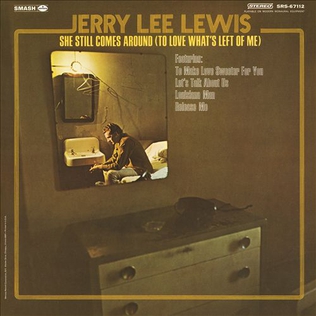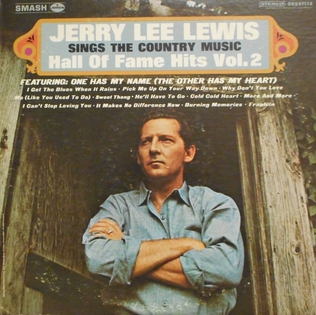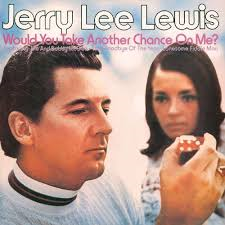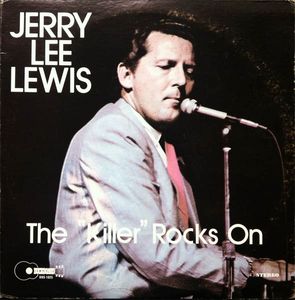
Jerry Lee Lewis was an American pianist, singer and songwriter. Nicknamed "The Killer", he was described as "rock 'n' roll's first great wild man". A pioneer of rock and roll and rockabilly music, Lewis made his first recordings in 1952 at Cosimo Matassa's J&M Studio in New Orleans, Louisiana, and early recordings in 1956 at Sun Records in Memphis, Tennessee. "Crazy Arms" sold 300,000 copies in the Southern United States, but it was his 1957 hit "Whole Lotta Shakin' Goin' On" that shot Lewis to worldwide fame. He followed this with the major hits "Great Balls of Fire", "Breathless", and "High School Confidential".

"Chantilly Lace" is a 1958 rock and roll song by The Big Bopper. It was produced by Jerry Kennedy, and reached No. 6 on the US Billboard Hot 100. Bruce Channel covered the song on his 1962 album, Hey! Baby. The song was also covered by Jerry Lee Lewis in 1972.

Live at the Star Club is a 1964 live album by rock and roll pianist and singer Jerry Lee Lewis, accompanied by the Nashville Teens. The album was recorded at the Star-Club in Hamburg, West Germany on April 5, 1964. It is regarded by many music journalists as one of the greatest rock and roll albums ever, noted for its hard-hitting energy and Lewis' wild stage presence.

This is a detailed discography for American rock and roll, country, and gospel singer-songwriter Jerry Lee Lewis (1935–2022). One of the pioneers of rockabilly, Lewis recorded over 40 albums in a career spanning seven decades. Lewis was a versatile artist, and recorded songs in multiple genres. Lewis, in 1986, was one of the first inductees into the Rock and Roll Hall of Fame, and was the last surviving rock and roll pioneer of Sun Records. Some of his best known songs are "Great Balls of Fire", "Whole Lotta Shakin' Goin' On", and "High School Confidential". His album, Live at the Star Club, Hamburg, is widely considered one of the greatest live concert albums ever. In his lengthy career in music, Lewis had 30 songs reach the top ten on the "Billboard Country-and-Western" chart. Lewis was regarded as one of the greatest and most influential pianists of the rock and roll era, and was ranked number 24 on Rolling Stone magazine's list of the "100 Greatest Artists of All Time".

"High School Confidential" is a 1958 song written by Jerry Lee Lewis and Ron Hargrave as the title song of the MGM movie of the same name directed by Jack Arnold.

She Still Comes Around (To Love What's Left of Me) is the ninth album by Jerry Lee Lewis. It was released on Smash Records in 1969.

She Even Woke Me Up to Say Goodbye is the 13th album by pianist and singer Jerry Lee Lewis. It was released on Mercury Records in 1970.

Sings the Country Music Hall of Fame Hits, Vol. 2 is the 11th album by Jerry Lee Lewis, released on Smash Records in 1969.

The Golden Hits of Jerry Lee Lewis is the third studio album by musician Jerry Lee Lewis that was released on Smash Records in 1964. It was Lewis's first album with the label after leaving Sun Records.

Soul My Way is the seventh album by Jerry Lee Lewis released on the Smash label in 1967.

Country Songs for City Folks is the fifth studio album by Jerry Lee Lewis released on the Smash label in 1965.

The Return of Rock is the fourth album by Jerry Lee Lewis released on the Smash label in 1965.

Would You Take Another Chance on Me? is an album by Jerry Lee Lewis that was released on Mercury Records in 1971.

The Killer Rocks On is an album by Jerry Lee Lewis that was released on Mercury Records in 1972.

Country Memories is a studio album by the American musician Jerry Lee Lewis, released on Mercury Records in 1977. It peaked at No. 21 on Billboard's Top Country Albums chart.

Killer Country is a studio album by Jerry Lee Lewis, released on Elektra Records in 1980. The album peaked at No. 35 on Billboard's Top Country Albums chart.

The Greatest Live Show on Earth is a live album by the pianist and rock and roll pioneer Jerry Lee Lewis. It was released on Smash Records in 1964. It was Lewis' best-selling album of the decade, with its cover of Tommy Tucker's "High Heel Sneakers" becoming a mild pop hit.

"Baby Baby Bye Bye" is a song recorded by Jerry Lee Lewis and released as a single in March 1960 on Sun Records, Sun 337, featuring the Gene Lowery Singers, backed with "Old Black Joe". The recording was reissued in 1969 as a 7" 45 single as Sun 42 as part of the Sun Golden Treasure Series. The song was also released in the UK in 1960 as a 45 single on London Records as HLS 9131.

"Baby, Hold Me Close" is a song written by Jerry Lee Lewis and Bob Tubert and released as a single by Lewis in the U.S. in February 1965 on Smash Records. The song was also released in the UK in 1965 as a 45 single on Philips Records.
"Another Place, Another Time" is a song written by Jerry Chesnut and originally recorded by Del Reeves.



















